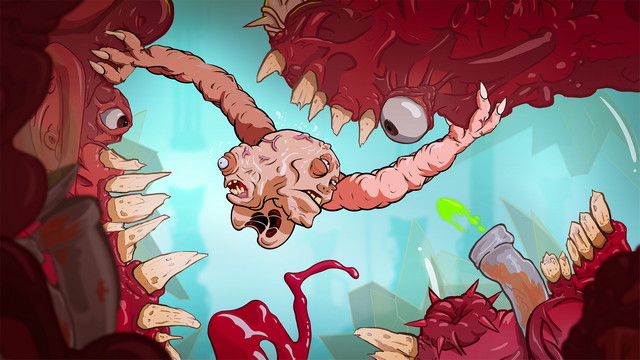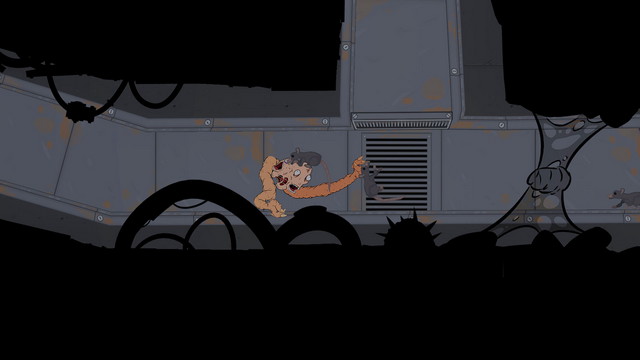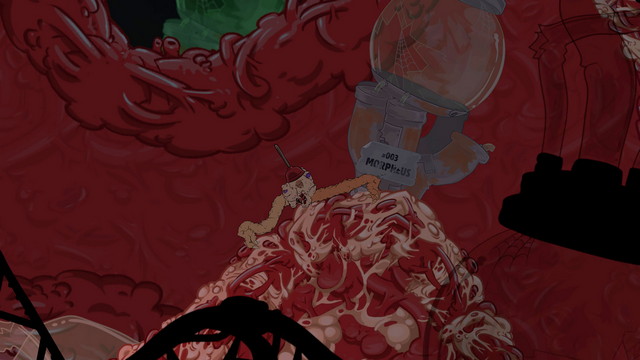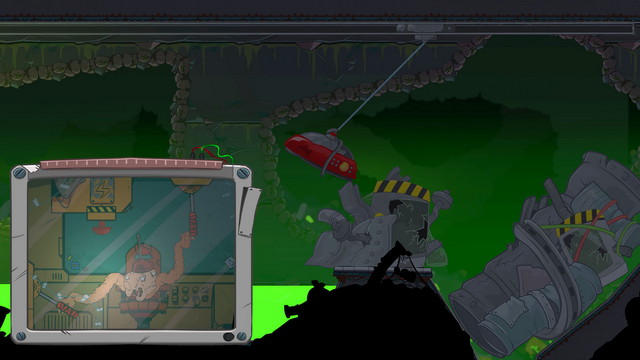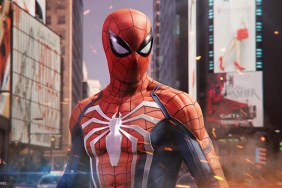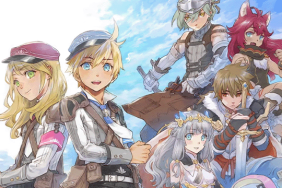Struggling is like David Cronenberg made a multiplayer version of QWOP or Getting Over It with Bennett Foddy, and I love it. Chasing Rats Games has taken a simple concept, independent control of a character’s limbs, and turned it into an incredibly weird but engrossing journey with Struggling.
I got a chance to play Struggling with Chasing Rats CEO Alexis Gallant-Vigneault
in a hands-on preview. I went into the experience with little prior knowledge of the game. I had seen the trailer and was intrigued, but it wasn’t until I sat down with Alexis that I realized I was playing the next Twitch sensation.
Struggling has one or two players controlling Troy, a twisted lab-grown amalgam of the mythical heroes Hector and Achilles. Alexis and I played via Steam Play Together, and each of us controlled one of Troy’s limbs. It’s up to you and the other player to get the little flesh ball through the game. Struggling starts off easy enough, letting you get your bearings, but soon you’ll be swinging across ropes, avoiding acid, and running from the other not-so-nice creatures grown in the lab.
Since Troy can only move via his two arms, you’ve got to coordinate with the other player continuously. That’s where a lot of the fun of the game comes from. Two players who mesh well can propel Troy with ease, whereas those who don’t will find it hard to get through the first areas. Struggling is a real test of teamwork that continues to rise in difficulty as the game gives you more powers and throws more obstacles in your way.
We’ll go into more detail in our upcoming review. For now, check out the first hour of gameplay and our interview with Alexis Gallant-Vigneault below.
Game Revolution: How did the team at Chasing Rats Games decide on the premise for Struggling?
Alexis Gallant-Vigneault: Well, the first thing that we wanted to do was a multiplayer game, where two players control a character. One of the reasons why we did this is because we played games like Octodad that use weird physics-based gameplay in a nice way. But, we wanted to have something that felt more like an adventure. It’s something that was different in terms of pacing, than the usual physics-based game. There’s also the kind of rage game part of it that is mostly coming from games like Getting Over It. That was also a good inspiration. It sometimes feels uninstinctive to create games that are meant to be frustrating, but also we want people to keep playing. So, we’re having like an existential debate sometimes between what we want to do in an adventure, physics-based game, where we want to go on a journey with your partner, and also having something that is difficult and feels a bit awkward in terms of character control. But, I think that we hit the sweet spot there on the amount of difficulty while still having something that you want to look forward to.
Game Revolution: Did the basic gameplay loop come together quickly?
AGV: Oh no, it takes a lot of iteration. There’s something that we call developer difficulty. As you’re developing the game, you’re playing more and more. So, you’re getting better and better too. When you’re trying to make something that’s difficult, and you’ve played thousands of hours of this game, it’s hard to create content that feels balanced for someone that will not play as much as you as the developer of the game. Of course, we know that people will get better than us and find the game easy after some time. But we’re trying to develop challenges that are balanced for players that have been playing maybe 10 hours or 5 hours, and at the same time design challenge for us as experienced players. So, we have to tone down a lot of encounters sometimes to make sure that we have something isn’t too hard for certain types of players.
AGV: It came really early in the process, but at first we wanted to do a game of all the two-headed ogre. Initially, the idea was that each player would control one arm and one leg. Also, the two heads could interact to do things like drinking oil to breathe fire on a torch. When we were prototyping, we began by just messing around with the arm function, just having a square with two arms. We decided let’s make him grab everything. And just with this kind of prototype discovery, we found a fun balance with something that was not too complex, but still had a lot of potential. From there, we found multiple levels of design ideas and interaction that could go with only the two arm controls.
GR: How did you decide on the body horror aesthetic for the game?
AGV: So, we decided to go with something more simple than we wanted to originally. And as soon as this prototype was kind of ongoing, that’s where Dennis, our art director, came with a few ideas, but this was one of the first ideas that he had. We did more exploration about this, but in the end, we were always coming back to this weird fleshy monster, mostly because it’s different. Everyone that we show, our girlfriends and family, everyone was disgusted by it, but everyone was having a reaction. So, we think that in an industry, as big as the video game industry, when you’re an indie, you try to stand out having something that everyone has an opinion about. It’s really a force that we wanted to put forward in our game. We like it because it’s funny and absurd, so we had so much fun working on this. So, the tone of the game is something that we’re really happy with.
GR: How long has struggling been in development?
AGV: It’s been about two years. Yeah, I think that we’ll hit the two-year mark in September. It was supposed to be a lot quicker. In the beginning the scope of it was different and it changed a lot during the evolution of it. Also, as a startup, sometimes you have to figure out some stuff before you can get started. But, when we joined an organization called the Indie Asylum, which is a group of developers from Montreal that go to the same office to try to share resources and share expenses together, to have a bigger impact in general, and we got a lot of help from there. Overall, we decided to remodel a bit, and rethink a lot about the game at this point. So, most of the game has been developed in the past year, but we were still starting the company and started to work on the game and try and find to find funding for it for the year before.
GR: Two-years is pretty brisk for game development. Did you plan to release the game earlier?
AGV: Yeah, well, we, some people might have seen the game earlier because we’re at PAX East and E3 in 2019. And some people might have heard us or seen some other posts that we did on social media saying that we wanted to do a release in the fall of 2019, but this, this kind of thing that happens in game development. Sometimes there’s multiple delays and it’s not something that just affects indies. You can see that the bigger companies that are pushing their release dates further back. You don’t always have all the information that you need to really have a good scope, and sometimes there are also good opportunities that require you to postpone your launch because you want fans to have a to better reaction to the finished product. That’s what happened with us. Our calendar made sense for a Fall 2019 launch, but when we got the opportunity to work more on the game and have something more polished and more developed with the new resources that we added, it made a lot more sense to move with it. As a result, the game now is something that’s a lot more in line with our initial vision.
GR: So, initially, the release date was predicated on the budget?
AGV: Yeah, exactly. You have to manage your research. We don’t have infinite money. So, in fact, most of the release date that we had was mostly figured around the budget. We underestimated the time and energy that starting a business requires while also trying to develop a game. There’s a lot of things that we had to figure out quickly and react quickly to. So, we are really happy to be at this point, but sometimes we had some ups and downs and there were some really difficult decisions to make during the whole process, but it was quite a journey.
AGV: This is sometimes it’s the reality of indie studios. We were fortunate enough to find some funding and to have good partners that joined us in this journey and opportunities that got us where we’re at right now, releasing a game that’s we’re really proud of.
